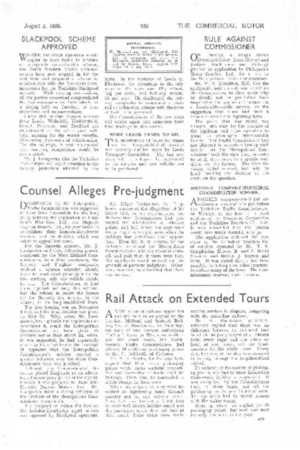Counsel Alleges Pre-judgment
Page 33

If you've noticed an error in this article please click here to report it so we can fix it.
nOMINANCE by the Metropolitan L./Traffic Commissioner was suggested to have been responsible for the_ long delay between the application of Fingland's Hire Cars, Ltd., and Majestic Express Motors, Ltd., for permission to co-ordbliate their London-Manchester services, and the decision, which was taken to appeal last week.
For the Majestic concern, Mr. J. Lustgarten said that, following general comments by the West Midland Commissioners, some time previously, the Majestic and Fingland companies .evolved a scheme whereby, should there be insufficient passengers on the. two services, only one vehicle should be run. The Commissioners of four areas rejected not only this scheme, but also refused to renew the licence for the Majestic day service, in the winter, in its long-established form.
The first hearing was on November 8 last, and the final decision was given on May 22. Why, asked Mr. Lustgarten, having heard the application on November 8, could the Metropolitan Commissioner not have given his decision earlier than March 22, when, it was suggested, he had apparently made up his mind before the hearing? It appeared that the Metropolitan Commissioner's opinion exerted a greater influence over the other Commissioners than was justified.
Although the Commissioners' decisions placed Finglands at an advantage, the company joined in the appeal, because it was prepared to share with Majestic Express Motors, Ltd. Mr. Lustgarten made a strong criticism of the attitude of the Metropolitan Commissioner towards him.
The proposal to reduce the fare on the London-Manchester night service was opposed by Blackpool operators. Mr. Edgar Lustgarten, for Pinglands, supported the allegations of his father that, by his interruptions, the. Metropolitan Commissioner had prevented the introduction of relevant points, and had denied the applicants everything they sought, even when the railways had withdrawn their opposition. Even Mr. R. R. Smylie, for the railways, criticized the Metropolitan Commissioner's attitude towards counsel, and said that, if there were bias, the appellants could succeed on the grounds of perverse judgffient. Otherwise, however, he submitted that there was no case.












































































